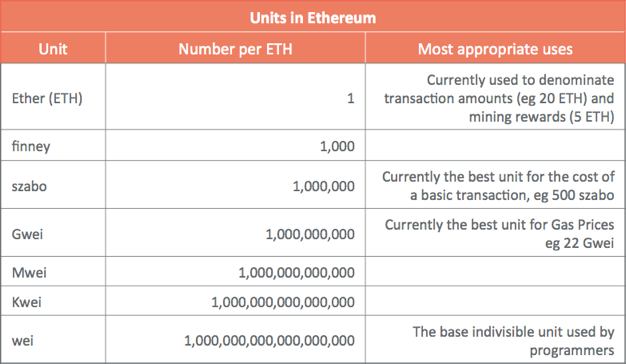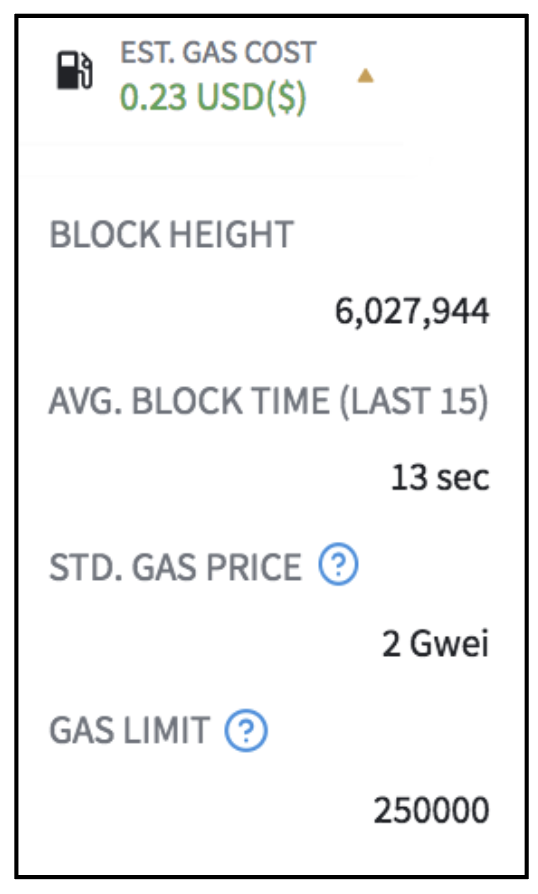What are gas fees?
Updated
by Andrew Hall
While gas in everyday life is thought of as the stuff the powers your car, gas in crypto is what is used to power the Ethereum blockchain. Whenever you want to make a transaction on the Ethereum blockchain, you must pay a gas fee (GWEI), which is paid in Ether, to the miner who used a portion of their computing power to include your transaction in the block.
Your gas fee can be separated into two different pieces:
Gas Limit
Gas Price
The Total Transaction Cost, also known as the “Tx Fee” can be calculated by the equation:
tx fee = gas limit * gas price
A good analogy can be found below as featured in a myetherwallet article:
"You can think of the gas limit like the amount of liters/gallons/units of gas for a car. You can think of the gas price as the cost of that liter/gallon/unit of gas.
With a car, it's $2.50 (price) per gallon (unit).
With Ethereum, it's 20 GWEI (price) per gas (unit).
To fill up your "tank", it takes...
10 gallons at $2.50 = $25
21000 units of gas at 20 GWEI = 0.00042 ETH.
Therefore, the total TX fee will be 0.00042 Ether.
Sending tokens will typically take ~50000 gas to ~100000 gas, so the total TX fee increases to 0.001 ETH - 0.002 ETH."
Gas Limit
The gas limit is the total number of gas you are agreeing to pay for your transaction. The amount of gas required for your transaction to be included in the block is predetermined so that you do not have to worry about lowering it.
The typical ETH transfer requires a gas limit of 21000 gas; however, this number may change depending on the amount of computational power that is required to get your transaction on the block.
One thing to remember is to specify enough gas to cover the cost of your transaction. On Everbloom, we use a gas limit of 250000 to ensure the likelihood of your transaction going through. If you manually change the amount of gas you’re willing to pay and it turns out to be less than the amount required, your transaction will not go through via “Out of gas” exception.
Gas Price
The second aspect of the Tx fee is the gas price, being the price per unit of gas you are willing to pay. Again, think of this as the $ / gallon you see when you drive past the gas station. Instead, this is the number of Ether you’re willing to for each unit of gas. Since the transacting cost of interacting with the Ethereum blockchain is so small, gas is usually measured in “GWEI”. A chart showing its relation to ETH can be found below.

Since all of this can be confusing for a first time user, Everbloom will provide users with a recommended gas price based on the average gas price used and then add 1 to ensure your transaction occurs as quick as possible with the lowest fee. However, you have total control over both your gas limit and price. If you want to stay up to date on which gas prices are being accepted by miners, go to https://www.ethgasstation.info/ which is touched on more down below!

Featured above is a drop down panel from our exchange which shows you some information about the status of the Ethereum network and gas fees. You may notice on occasion that our gas prices may vary from theirs. This is because they display a median gas price while we display the current network standard price. On top of this, we use 250000 as our default gas limit to lower the chances of running into an out of gas exception.
Two minor details that have not been touched on in the photo above are block height and average block time. The block height is simply the number of blocks between the current block and the genesis block (block 0) of the network. The average block time is the average out the time it took for each subsequent block to be mined and produced, in this case, for the previous 15.
Can I increase the likelihood of my transaction time?
Yes, you can! As briefly mentioned above, the higher the gas price the more rewarding it is for a miner to validate and include the transaction onto the next block. Just increase your gas price if you want to increase your transaction time.
Do I have to pay gas to cancel an existing order?
In a decentralized exchange, you always have control over your funds while your orders are sent directly to the blockchain void of a third party exchange. Because your transactions as sent directly to the blockchain, you must pay a small gas fee to remove your existing order.
How do I know what price miners are accepting?
A great resource for this is: https://www.ethgasstation.info/
This website provides an in-depth look at the prices miners are accepting and gauge yours accordingly.
